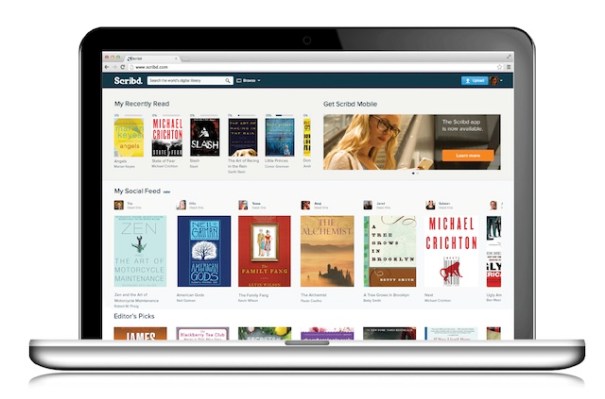The latest company making a bid to bring the subscription model to the book world is one that may already be familiar to TechCrunch readers — social publishing service Scribd.
Scribd first launched in 2007, offering users a platform for users to share documents and other written content. We use it ourselves as a way to upload and embed documents that are relevant to our stories. For Scribd, moving into the subscription books business doesn’t seem like a huge leap, and several of the most important pieces are already in place.
For one thing, the company actually launched an e-book market back in 2009. And it already has users paying a subscription fee for access to premium content — in fact, co-founder and CEO Trip Adler told me the company “soft launched” this service in January by adding books to its premium offering, and that the service has been growing 60 percent for each month since.
Today Scribd its making its ambitions on this front clear, in part by announcing its first big deal with a major publisher — HarperCollins. The companies say that the “majority” of the back catalog for HarperCollins US and HarperCollins Christian will now be available in Scribd’s subscription service, with featured authors including Paolo Coehlo, Neil Gaiman, Marian Keys, and Elmore Leonard. That means Scribd subscribers won’t have access to most of the newest HarperCollins books — but the publisher’s full catalog, including new titles, will be available for purchase on an individual basis.
Adler emphasized three main points that characterize the Scribd system (and may help distinguish it from other “Netflix for books” competitors like the recently launched Oyster).
First, readers only pay $8.99 per month and can read unlimited books — Adler said this is a pricing model that has “worked incredibly well for videos and music.” Second, because the subscriptions are integrated with Scribd’s existing social platform, it facilitates book discovery in new ways. Third, Scribd’s approach is “device agnostic”, with iPhone, iPad, and Android apps, as well as a website that works on both desktop and mobile browsers.
To demonstrate the last point, Adler gave me brief demos on a MacBook, an iPhone, and a Kindle Fire. The reading experience was synchronized across all three devices, so he could stop reading on one, then when he opened the book on another device, it would bring him to exactly where he left off. (While tracking where you are in a book, Scribd also tries to distinguish between moments when you’re actually reading and progressing in a book and others where you’re quickly skipping back-and-forth, say if you’re trying to look something up from earlier.)
And yes, you can embed books just as you can other types of Scribd content, and if it’s a subscription-only book, you’ll only be able to read an excerpt before you’re asked to subscribe. (You can see an embedded Neil Gaiman novel below.) Eventually, Adler suggested that users will be able to log in to Scribd directly from the embed and read an entire book if they want.
I also spoke to Chantal Restivo-Alessi, chief digital officer at HarperCollins, about the publisher’s perspective on the deal. She told me that HarperCollins has done “small subscription pilots” with other services, but that this is the first time it has made so much of its back catalog available. As for why it chose to work with Scribd, Restivo-Alessi noted that the service has already built an impressive userbase (80 million active users, according to Scribd). She also said it’s important that Scribd is willing to share its data, so HarperCollins can learn about what’s working and what’s not.
So how significant will the subscription model be in book publishing?
“I really believe in books we’re going to continue to live in a mixed world much more” than other media, she said, adding that readers already “live in both the physical and digital worlds,” and while digital subscriptions will be a growing part of the mix, no single model will dominate. “Often people compare music and books, but they overlook the unbundling effect [i.e., the desire to buy individual songs versus a whole album] that existed in music. That isn’t actually true in books.”
Adler added that even though the company was doing reasonably well (he said Scribd is profitable with tens of millions of dollars in revenue), he sees the subscription model as the path that takes Scribd to the next level. He suggested that this approach also gives digital books a big leg up over their physical counterparts: “Before, you were just getting a physical file. Now you’re getting an entire library.”
American Gods by HarperCollins
